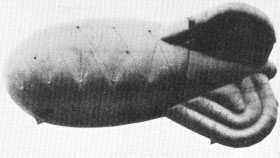 Click
for Site Directory
Click
for Site Directory
POLICY REGARDING RESTORATION OF STATIC BALLOON BARRAGES
IN AIR DEFENCE GREAT BRITAIN AFTER "DIVER" (V1) THREAT CEASES.
Report by the Sub-Committee for the allocation of active air defence.
In July 1944 the Government decided it had to produce a policy following a request by the Air Ministry on the Air Defence of Great
Britain,( A.D.G.B. ) for guidance on those static balloon barrages which should be re-instated and those barrages which should no longer
be required, once the threat from the V1 Flying Bombs had been eliminated.
The Flying Bombs were known among the balloon crews and others as "Divers", since the bomb flew until it was out of fuel and then
dived down onto the ground.
The Air Staff were of the view that those air defence barrage balloons squadrons that were employed on "Anti-diver" duties were to be
maintained until at least 31st December 1944 and beyond until the threat from Flying Bombs was eliminated. By making a decision on
which barrages were to be eliminated meant that the A.D.G.B. were then able to begin withdrawing huts, and installations to reuse for
accommodation for the anti-diver barrage on a more permanent basis during the coming winter period.
It was proposed that the former static barrages be re-classified into three categories:
Category 1.
This was where balloons were likely to be required at full barrage status and where all Headquarters, huts, installations and facilities
were to be left intact.
Category 2.
This was where balloons were likely to be required on a token basis only and the Headquarters, huts etc., that were deemed surplus
to operational requirements
could be removed straightaway.
Category 3.
This was where balloons were not likely to be required on a token basis only and the headquarters, huts etc. surplus to these
requirements, could be removed immediately.
The Chiefs of Staff Anti-aircraft Committee considered the latest assessment of the scale of ait attack on Britain and felt the
re-categorisation was an acceptable position with the provisos that in the case of :
(i) London, all headquarters, huts, installations and facilities were to be retained but the strength of the re-instated barrage was to be
more than the token barrage of 50 balloons and the final strength to be determined on the air situation at the time of re-instatement.
(ii) Scapa Flow, the huts and installations could be withdrawn and the need to replace the barrage was something that was to be
reviewed at the end of September 1940.
(iii) A provision was needed for there to be a mobile reserve of balloons for despatch to any particular area at short notice if a attack
threat was found to be credible.
(Here they suggested that the Germans might leave Western France and set up a stronghold in the Low countries from which they might
launch attacks on the East coast.)
An estimate was made of the numbers of balloons needed countrywide once the V1 Flying Bomb attacks had been neutralised.
|
BALLOONS REQUIRED AT FULL BARRAGE STATUS. ALL HEADQUARTERS, HUTS, INSTALLATIONS AND FACILITIES TO BE LEFT INTACT. |
BALLOONS REQUIRED ON TOKEN BASIS ONLY AT FULL BARRAGE STATUS. ALL HEADQUARTERS, HUTS, FACILITIES, AND INSTALLATIONS SURPLUS TO THIS REQUIREMENT TO BE REMOVED FORWITH |
BARRAGES NOT REQUIRED. ALL HEADQUARTERS, HUTS, FACILITIES, AND INSTALLATIONS TO BE REMOVED FORWITH |
|
BARRAGE TOWN AND NUMBER OF BALLOONS |
BARRAGE TOWN AND NUMBER OF BALLOONS |
BARRAGE TOWN AND NUMBER OF BALLOONS |
|
DOVER 24 |
|
|
|
LONDON 300 |
PORTSMOUTH 30
|
SCAPA 40 |
|
THAMES 20 |
SOUTHAMPTON 22 |
FORTH 46 |
|
HARWICH 30 |
PLYMOUTH 33 |
NEWCASTLE 62 |
|
HULL/HUMBER 3 |
|
SUNDERLAND 20 |
|
|
|
BILLINGHAM 42 |
|
|
|
NORWICH 20 |
|
|
|
YARMOUTH / LOWESTOFT 25 |
|
|
|
CHELMSFORD 31 |
|
|
|
CANTERBURY 24 |
|
|
|
LANGLEY 20 |
|
|
|
WEYBRIDGE 20 |
|
|
|
YEOVIL 24 |
|
|
|
FALMOUTH 24 |
|
|
|
WESTERN-SUPER-MARE 20 |
|
|
|
BRISTOL 65 |
|
|
|
BROCKWORTH 20 |
|
|
|
NEWPORT 20 |
|
|
|
CARDIFF/ BARRY/ PORT TALBOT/ SWANSEA 40 |
|
|
|
DARTMOUTH (MK VI) 20 |
|
|
|
|